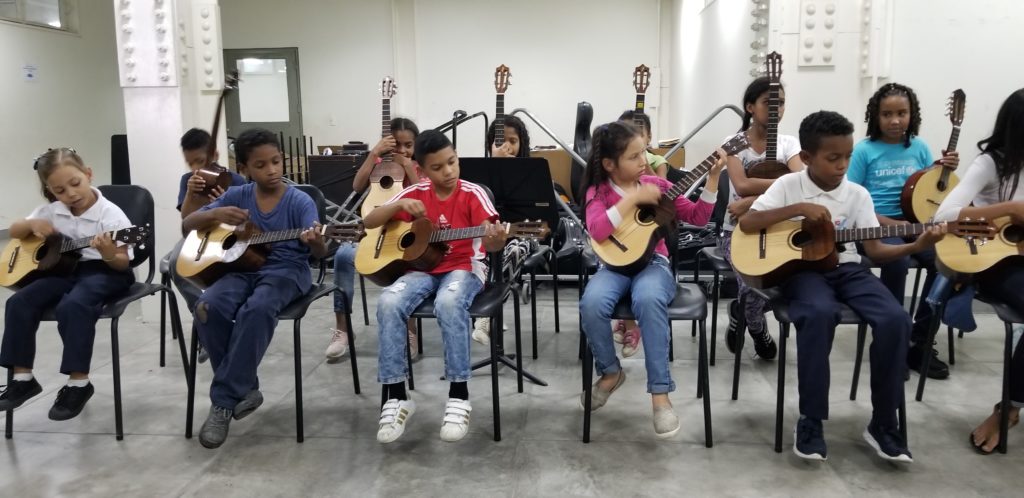What We Have Seen and Heard: Testimonies of a Pilgrimage to Venezuela
Leaders from the Christian Church (Disciples of Christ) in the U.S. and Canada and the United Church of Christ in the U.S. engaged in a Pilgrimage in solidarity with the people of Venezuela from September 23rd– 27th, 2019. John Dorhauer and Teresa “Terri” Hord Owens, General Ministers and Presidents of both churches, teamed up with Julia Brown Karimu and Karen Georgia Thompson, the two Global Ministries Co-Executives, to affirm their desire to accompany our partner church in Venezuela on their pastoral and prophetic work for peace and justice in the country. In their travel, they met key actors in the present situation on the Venezuelan society and had the opportunity to listen to the contextual analysis and challenges faced in the country as well as mechanisms for our work of solidarity. In addition to that, they all traveled to strengthen our commitment to establish a framework of solidarity and accompaniment to the people of Venezuela.
An arrival with music to our ears
September 23rd, 2019
Angel Luis Rivera-Agosto
We arrived in Venezuela after a long trip in which we had to spend the night in the Dominican Republic (Terri, Karen Georgia, Julia and I) and Panama (John). The initial tiredness of the trip had all the necessary circumstances to make us go to bed early that day. However, it was not like that. Our Partner in Venezuela had a “surprise” prepared for us (not for me, since I had planned this with our friends in Venezuela). In the afternoon, we rode a cable car that has the city, called the Metro Cable. There we were told that this means of transport was not one for fun or tourism, but that it was to assist workers by moving them in a round trip from the high hills of the San Agustín neighborhood to the center of Caracas. From the heights, we could appreciate the entire route that workers were saved with the mere use of this cable car.
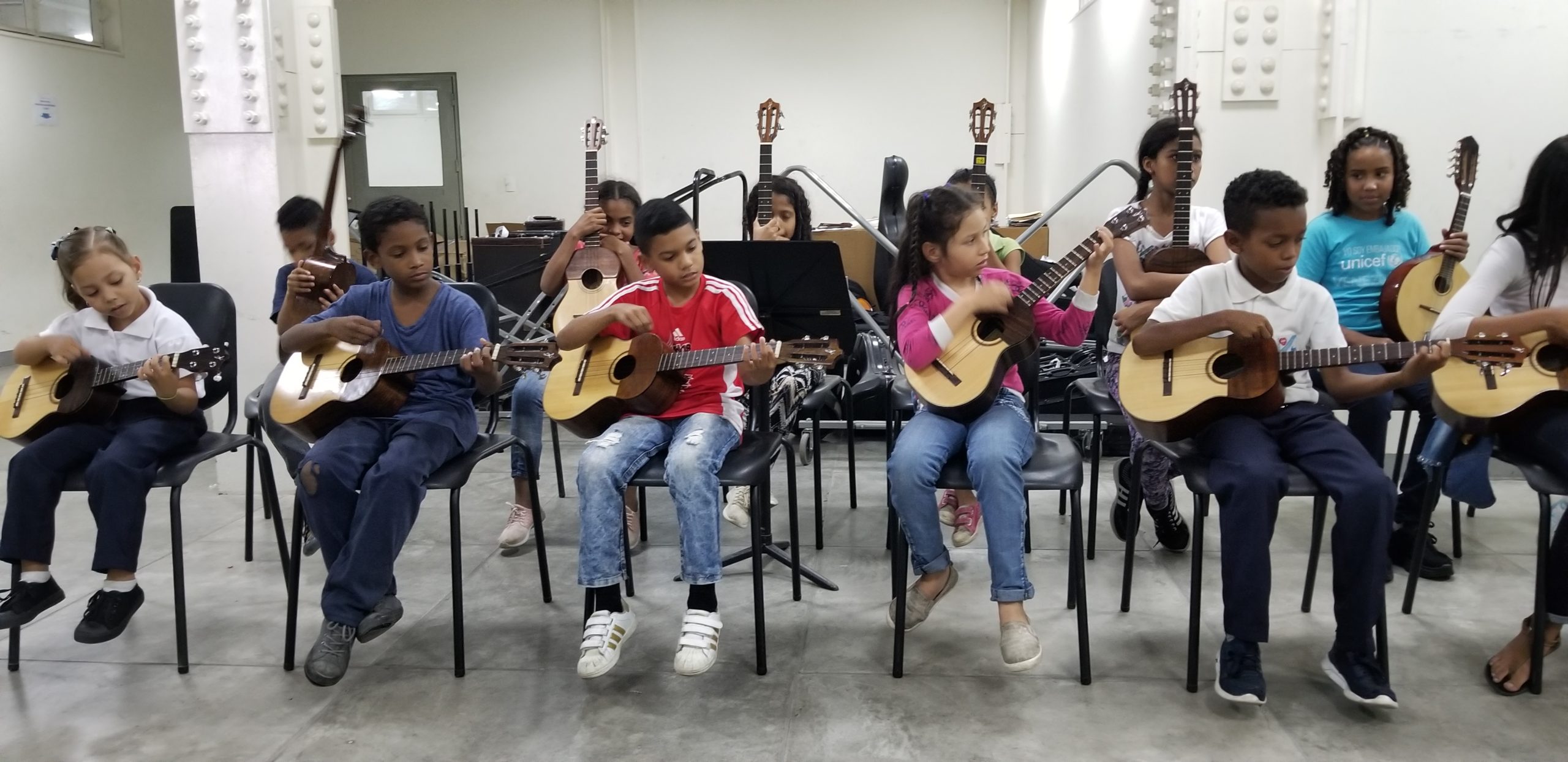 Once at the top of one of the hills of Barrio San Agustín, we came across a group of children, formed in two rows, in the manner of a metal orchestra. They had a musical welcome for us ready! We were very touched by the seriousness and professionalism of those young musicians. However, that was not all. From there, they moved us to a hall where a symphony orchestra received us between merengues and Handel’s Hallelujah. Still excited with such musical pieces, they passed us to a second hall, where an orchestra of guitars, Venezuelan cuatros, and mandolins delighted us with the songs “Alma Llanera” and “Venezuela,” among other pieces.
Once at the top of one of the hills of Barrio San Agustín, we came across a group of children, formed in two rows, in the manner of a metal orchestra. They had a musical welcome for us ready! We were very touched by the seriousness and professionalism of those young musicians. However, that was not all. From there, they moved us to a hall where a symphony orchestra received us between merengues and Handel’s Hallelujah. Still excited with such musical pieces, they passed us to a second hall, where an orchestra of guitars, Venezuelan cuatros, and mandolins delighted us with the songs “Alma Llanera” and “Venezuela,” among other pieces.
The director of what is known as “the National System of Youth and Children’s Orchestras and Choirs of Venezuela”, Angélica Texeira, explained that the program constitutes a social project of the Bolivarian Government of Venezuela dedicated to the pedagogical, occupational and ethical rescue of children and youth, through the instruction and collective practice of music. The objective of the “System” is to train, prevent, and recover the most vulnerable groups in the country, both for their age characteristics and their socio-economic status. The beauty of this project is to see how these children empower themselves and take their musical and collective tasks as a group so seriously. Particularly striking is how a process that in other countries can be highly elitist, such as formal music education, is available to all children in Venezuela, regardless of their social status. That is to do justice and love mercy, as the prophet Micah challenges us.
From Cerro San Agustín, we descended with a new melody in our hearts. The song of a childhood that is projected to the future with hope. As we descended from the hill in the cable car of the Metro Cable, we also felt the call to descend, to incarnate in the deepest needs, desires, and dreams, so that the Gospel continues to be music for the ears of the whole world, especially for our Venezuelan brothers.
Sures
September 24th, 2019
John Dorhauer
On the first day of our trip, we met with Lucretia and Christo. They are lawyers who work for a Venezuelan Human Rights organization, SURES. We met in a historic government building at which, over the decades, important documents were signed – including many treaties. Over two hours together, we discussed the past and current conditions of the people of Venezuela.
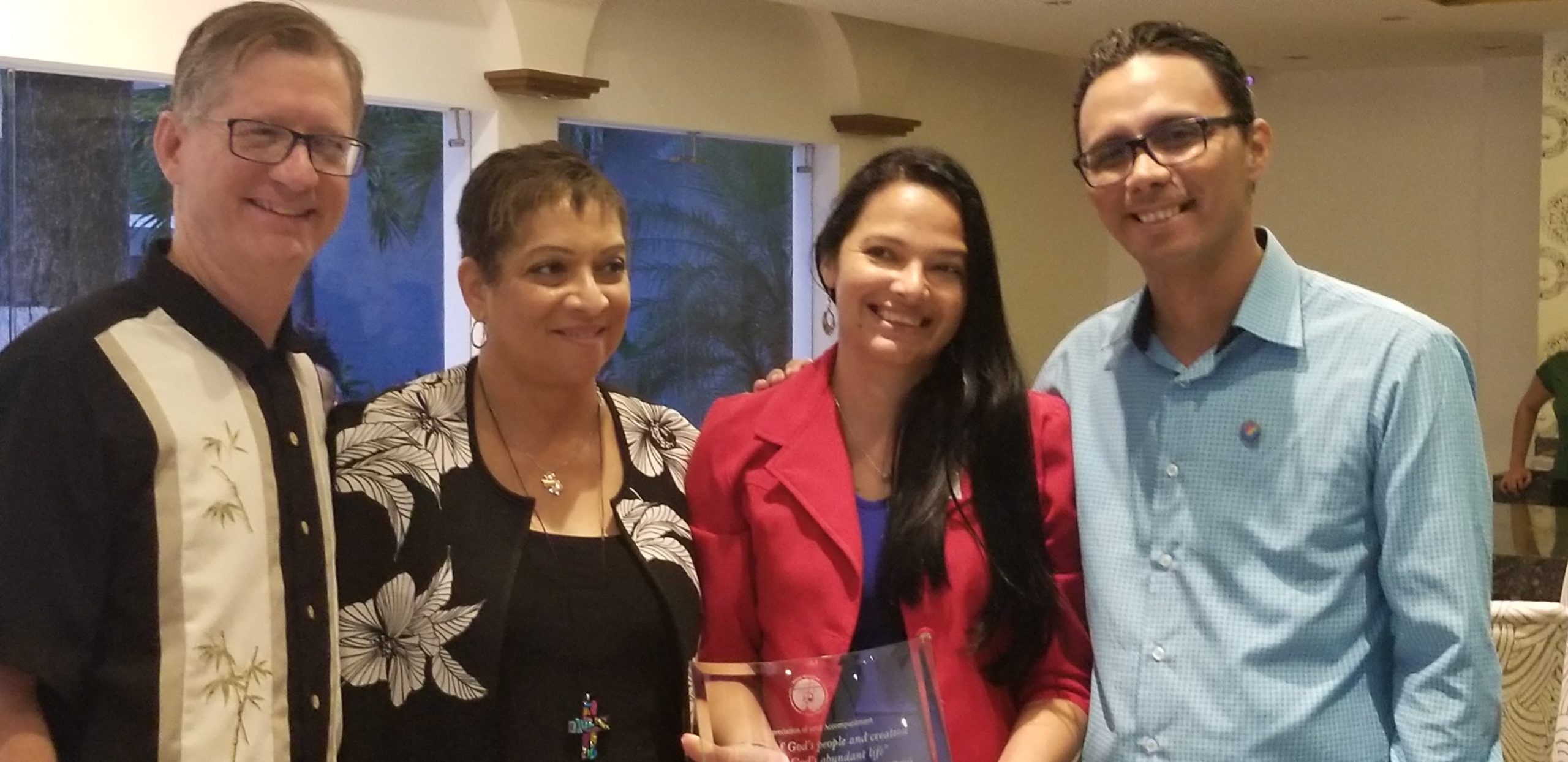 It was important for them to have us understand that there are no current critical human rights violations. They spoke of previous conditions in which almost 90% of the people lived below the poverty line. A new constitution, which Christo helped write for his country, includes many human rights declarations. Among those are articles establishing legal protection for indigenous peoples. We also learned that over 70% of the local leadership council positions called for in the constitution are held by women. The literacy rate, once one of the lowest in the world, has improved greatly. There are universal health care and a social security system that upholds minimum income standards for the people of Venezuela. Even though they still confront issues regarding police action and the length of judicial reviews on cases, they told us that there is a more vigorous policy on human rights than decades before.
It was important for them to have us understand that there are no current critical human rights violations. They spoke of previous conditions in which almost 90% of the people lived below the poverty line. A new constitution, which Christo helped write for his country, includes many human rights declarations. Among those are articles establishing legal protection for indigenous peoples. We also learned that over 70% of the local leadership council positions called for in the constitution are held by women. The literacy rate, once one of the lowest in the world, has improved greatly. There are universal health care and a social security system that upholds minimum income standards for the people of Venezuela. Even though they still confront issues regarding police action and the length of judicial reviews on cases, they told us that there is a more vigorous policy on human rights than decades before.
The most challenging and impactful statements we heard from these two advocates were concerning the current blockade/embargo imposed by the US government on Venezuela. The blockade has a deep effect on the health of the Venezuelan people, their access to food, and the economy of the country.
Regarding health, the US embargo has changed the overall safety of the nation in direct and devastating ways. Ninety thousand people in Venezuela are HIV positive. The embargo does not allow the medicine to treat and control that to enter the country. Diseases like malaria that once were nearly absent from the country are again gaining a stronghold.
Regarding the food supply, the US is choking the food supply here. Countless remote villages are dependent on food supplies provided by the Venezuelan government. Much of the food that is shipped in those boxes come from other countries that they import. The US has threatened allies that sell to Venezuela, making it very difficult for them to supply necessary food products to their people.
Finally, Venezuela is almost 90% reliant on oil to supply its wealth. They are an oil-rich nation. The US embargo, which includes pressure on allies not to trade with Venezuela, has greatly reduced the ability of this precious resource to fund the economy. Because many of the nations they now must sell to are oceans away, the cost of transporting it is too high and reduces the profit margin.
It was hard to hear all of this. The US is a major cause of many health hardships for this proud nation. Our embargo is also draining their economy of precious funds that could, and that throughout their recent history, has sufficiently sustained them. We will lift their plight, and do what we can to tell their story to our churches. It is the people, the children, especially, who are suffering from this political game we are playing.
Hands-on the cradle and the country
September 25th, 2019
Julia Brown Karimu
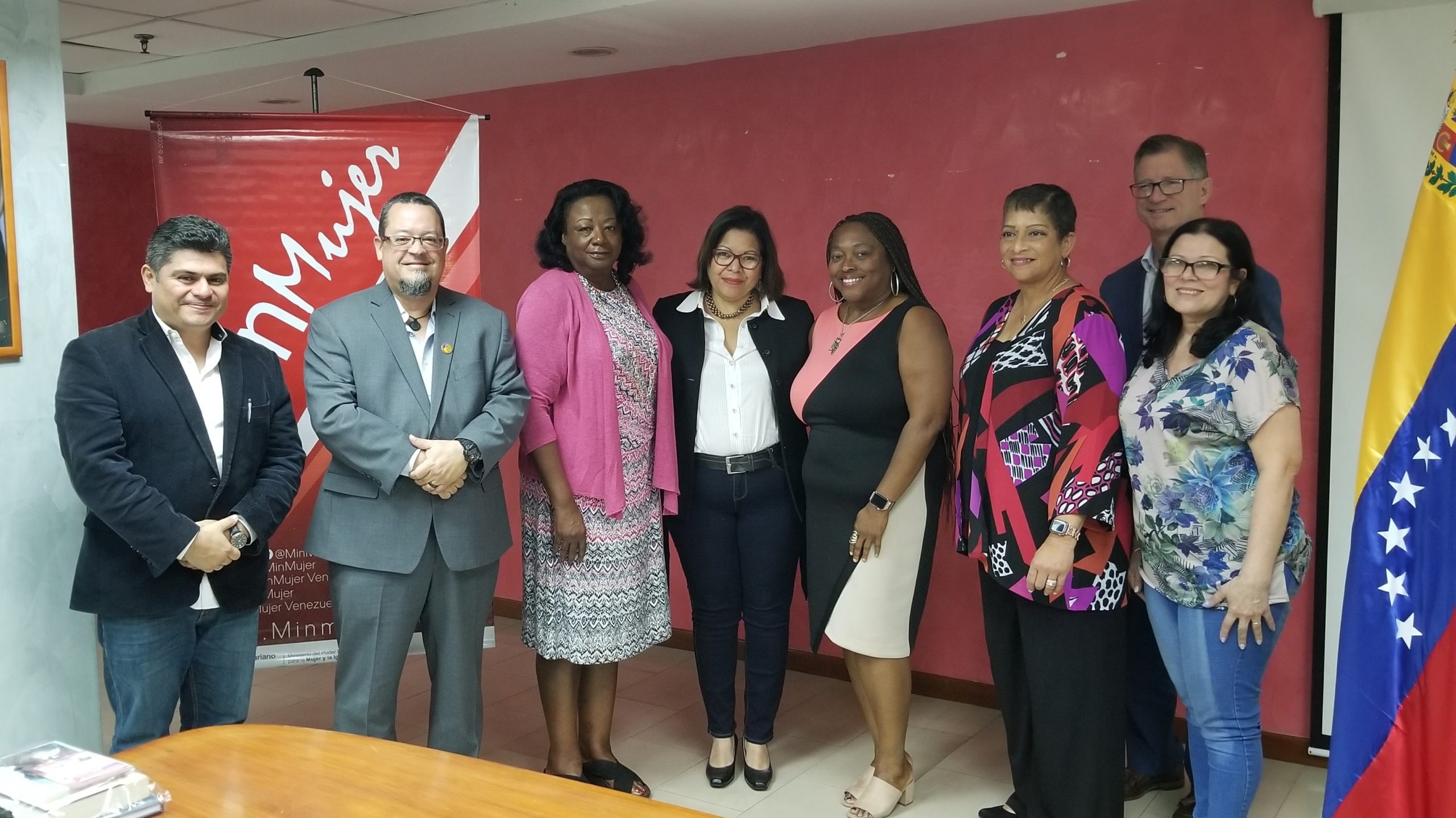 Over five years ago, I heard this quote in a YWCA Conference in Bethlehem, “A woman shakes the cradle with one hand and the world with her other hand.” This quote could have referred to Asia Villegas, Minister of Women Affairs, and Gender Equality in the national government structure of Venezuela. Asia comes to this position from her service as a physician. In a real sense, she is continuing to heal and bind the wounds of women in Venezuela through her service as a leading advocate for the health and rights of women to participate fully in society. As we met with Minister Villegas, she shared with us the following, “I am thankful for your delegation to come to Venezuela at this time to witness our reality.”
Over five years ago, I heard this quote in a YWCA Conference in Bethlehem, “A woman shakes the cradle with one hand and the world with her other hand.” This quote could have referred to Asia Villegas, Minister of Women Affairs, and Gender Equality in the national government structure of Venezuela. Asia comes to this position from her service as a physician. In a real sense, she is continuing to heal and bind the wounds of women in Venezuela through her service as a leading advocate for the health and rights of women to participate fully in society. As we met with Minister Villegas, she shared with us the following, “I am thankful for your delegation to come to Venezuela at this time to witness our reality.”
Therefore, we learned about the current reality of the people of Venezuela with a special emphasis on women. We learned that there are many different movements of women in Venezuela. There are Afro-Venezuelan women, indigenous women, women farmworkers, etc. The minister is working on ways to incorporate gender issues into public policies, which include social protection and the elimination of the feminization of poverty. The goals of the Minister are to reduce the death of mothers during childbirth, reduction of pregnancy at an early age, reduction of unnecessary cesareans, and an increase in the number of children that are breast-fed. Currently, 70% of women breastfeed their children.
Venezuela spends 70% of the national budget on social investments with the aim of producing a healthy population with opportunities to live full, productive lives. This may be seen in programs to provide homes, universal access to health care, and education and literacy programs.
However, all of these programs are being impacted by the blockade. Blockades hurt the most vulnerable within a country. The blockade affects food security, the ability of people to receive medical care and thus hurts the many programs that have been developed by women for women. It forces people to migrate, not because they want to leave their homes, but because they want life-giving opportunities for their children.
In closing, I will repeat the words of Minister Villegas, “A total blockade is impossible because people rise and encounter one another.” This is exactly what this pilgrimage accomplished. We encountered our sisters and brothers on a humane level and now understand more deeply their desire for self-determination without outside interference.
Preserving the Drums
September 25th, 2019
Karen Georgia Thompson
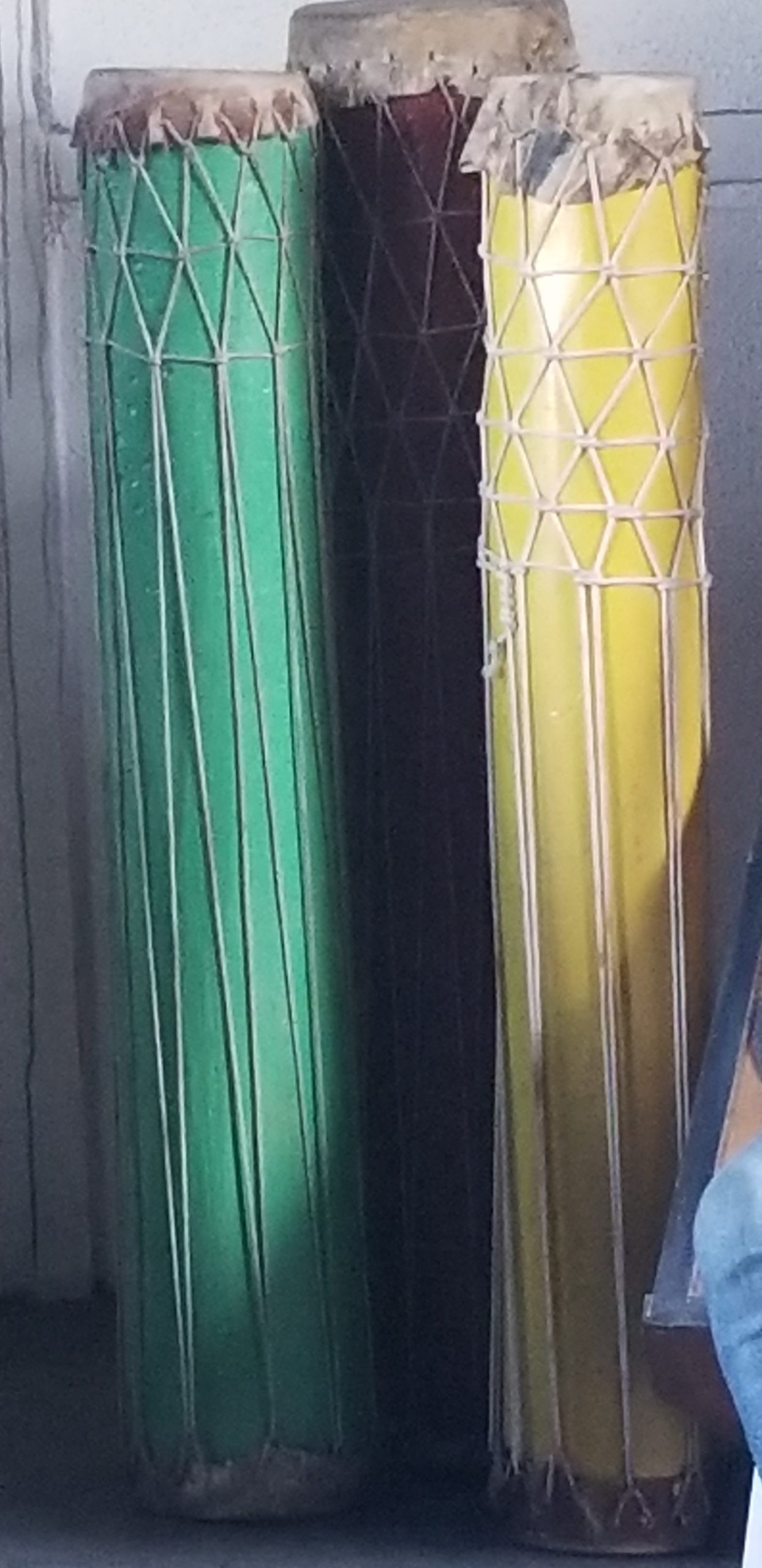 The drums are an important part of African heritage and tradition. The beat of the drum is more than music and rhythm. The drums hold traditions and rituals that are passed across generations. Each drum carries a different rhythm, holding sounds that call across time and space. The Afro Venezuelan community in Barlovento is preserving the rhythm of the drums, and with the drums, they are preserving heritage, culture, religion, and traditions that were brought into Venezuela by their African Ancestors.
The drums are an important part of African heritage and tradition. The beat of the drum is more than music and rhythm. The drums hold traditions and rituals that are passed across generations. Each drum carries a different rhythm, holding sounds that call across time and space. The Afro Venezuelan community in Barlovento is preserving the rhythm of the drums, and with the drums, they are preserving heritage, culture, religion, and traditions that were brought into Venezuela by their African Ancestors.
Barlovento is about 62 miles east of Caracas, a one hour drive depending on the traffic and time of day. Our late afternoon trip to visit this Afro Venezuelan community took us across the highways into a more rural existence, less hectic than the capital city. Barlovento was developed by Spanish colonizers who started cacao plantations in the region. “The work on the estates was done by African slaves brought from what is now the Republic of the Congo, Democratic Republic of the Congo and Angola. These people were from the Kingdom of Kongo and Kingdom of Loango. There were also Yoruba slaves.” (Wikipedia) These descendants of enslaved Africans are in the struggle for their freedom, dignity and human rights.
The visit to Barlovento was an opportunity to meet members of the community and hear about the projects and initiatives being undertaken – some of them a response to the embargo. The Global Ministries delegation met the leaders at the community center where the only Afro Venezuelan television station is housed, along with a resource library dedicated to Afro Caribbean, African and Afro Venezuelan history and culture. We saw the library and heard about the volumes that were acquired over the years through donations.
We were taken to the second-floor space that housed the television station called Afro TV, founded by Jesus “Chucho” Garcia. The smoked blacked and fire damaged walls were visible evidence to the vandalism by arson that attacked the work of the Barlovento community on December 18, 2018. The television station is a way that the community aims is to rescue their African heritage in the region and from other regions in the country. The messages in the media about the Afro Venezuelan community is negative. Through Afro TV, they are working to change the perceptions of the Afro Venezuelan communities. Afro TV wants to show a positive perspective of African descendant people, providing a counter-narrative to how the mass media projects African and African descendant people. With the studio in disrepair, there has been a shift to broadcasting online and continuing the work they started.
As with other places we visited, the lives of the people and the current projects they have undertaken are in response to addressing the challenges created by the United States economic embargo imposed on Venezuela. The people of this area are moving back to the traditions of their Ancestors, preserving heritage and culture along the way, as they return to the land for daily provision and economic sustainability.
Like many other communities in Venezuela, Barlovento became dependent on the oil that was found in the country. The embargo limits the ability to export oil. Imports are severely reduced. The community sits on fertile lands, and the people have returned to farming cacao (cocoa), maize, rice, yuca, and omucao. These items are helpful in a community where food that was previously imported is no longer available. The embargo reduced the availability of food, medicine, and resources needed to ensure that the people in the community are fed and healthy.
We met with leaders from an organization called The Body of Christ, a church-based organization connected to a Christian congregation. The pastor, his wife, and members of the congregation told the ways this congregation stepped in to help. They are using their resources to purchase medicine for the sick and to ensure that the gains made in reducing illnesses and health disparities are maintained. Working with Afro TV, The Body of Christ is focusing on spreading the gospel and providing services and programs for at-risk youth.
Additional projects like Maroons for Hope, which was started to develop cleaning products, are working toward industrialization for the benefit of the community. The project was able to apply for and receive funding from the government. The project was discontinued, and yet it continues to provide hope for others. Bearing the knowledge of the reasons the project was not successful, Maroons for Hope is helping other communities to find success through its failure.
And then there are the drums! Activist Freddie Blanco is teaching the drums and preserving all that they carry for this community. Blanco noted that “the Ancestors learned to play by listening,” and these descendants are doing the same. The community understands that knowledge of culture and identity is the basis for transformation. The drums are taught after the culture is explained.
Barlovento is a source of inspiration, a community vibrant with hope for a new future. The people are clear about their right to self-determination. There are many struggles in this community of people who are descendants of enslaved people taken from the African continent to work cacao plantations. Theirs is a journey in resilience and a struggle to overcome stereotypes to live lives that are lived in dignity and freedom. They are preserving heritage, culture, religion, and using plant medicine to ensure their survival for generations to come.
Faith and Liberation
September 26th, 2019
Terri Hord Owens
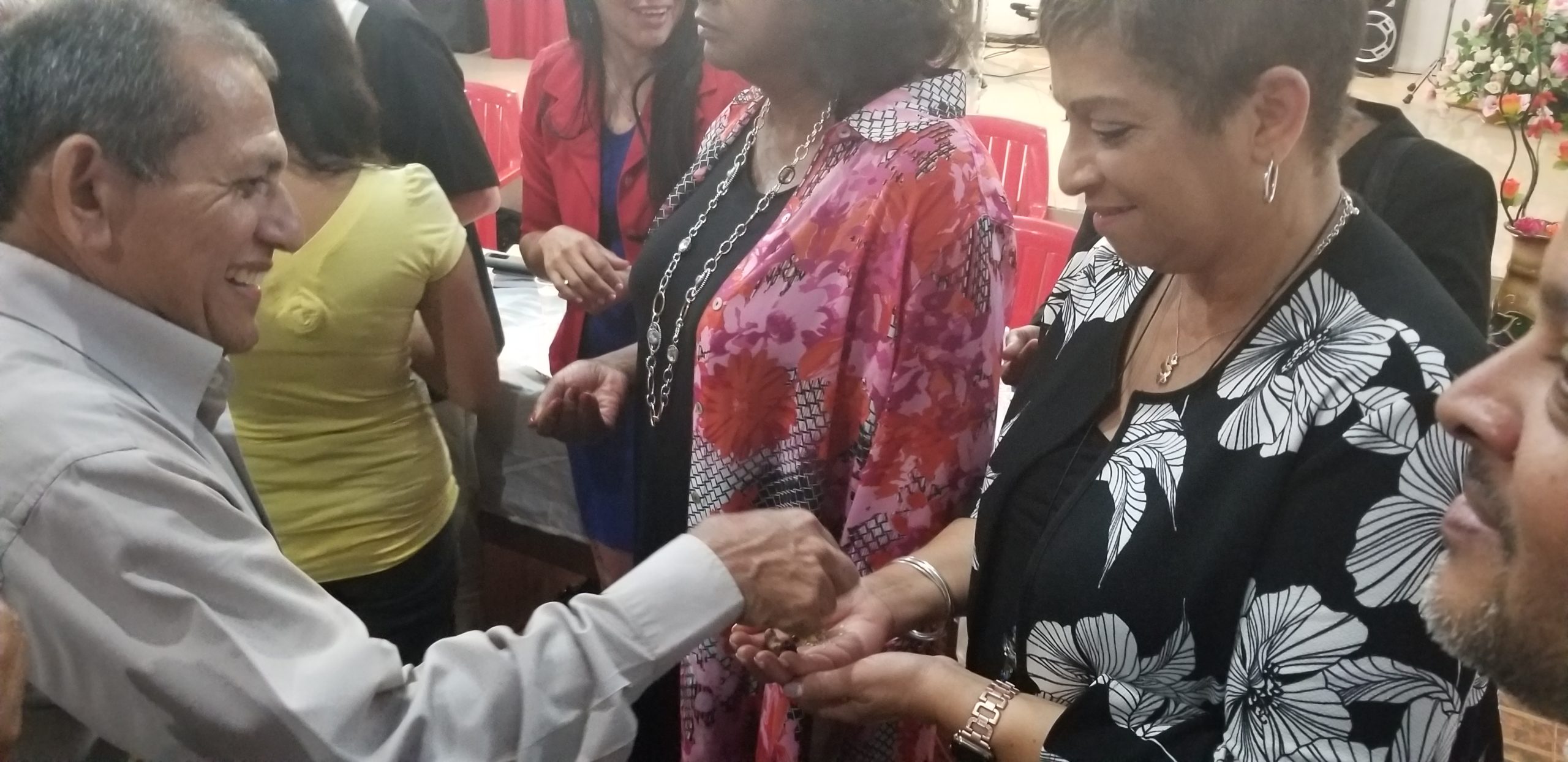 Our Pentecostal church partners in Venezuela welcomed us with prayer, singing, and prophetic voices. One expects prayer and singing when gathering with other Christians no matter where you are in the world. Our friends from the Evangelical Pentecostal Union of Venezuela (UEPV, acronym in Spanish) greeted us at our first meal together with songs and prayer. And as we traveled to meet with government officials, they were present to ask questions, provide context, challenge as necessary, and offer the voice of the church to raise issues to those in power. The church with whom we met was not silent. The Christian leaders with whom we ate, discussed and engaged with government leaders were not afraid to name the challenge and injustices faced by their communities. As my counterpart in the United Church of Christ, John Dorhauer put it: “Here, the church is not an institution; the church is a movement.”
Our Pentecostal church partners in Venezuela welcomed us with prayer, singing, and prophetic voices. One expects prayer and singing when gathering with other Christians no matter where you are in the world. Our friends from the Evangelical Pentecostal Union of Venezuela (UEPV, acronym in Spanish) greeted us at our first meal together with songs and prayer. And as we traveled to meet with government officials, they were present to ask questions, provide context, challenge as necessary, and offer the voice of the church to raise issues to those in power. The church with whom we met was not silent. The Christian leaders with whom we ate, discussed and engaged with government leaders were not afraid to name the challenge and injustices faced by their communities. As my counterpart in the United Church of Christ, John Dorhauer put it: “Here, the church is not an institution; the church is a movement.”
The declaration that Jesus is with the oppressed, the poor, the marginalized is a primary tenet of liberation theology. No one labeled their perspective specifically in this way, but for me, a student of liberation theology, it permeated all of our conversations, especially during our gathering of ecumenical leaders in Caracas. From Pentecostal to Methodist, from Baptist to Anglican, we heard leaders speak of the importance of the church to ensure equality for women, economic equality for all Venezuelans, justice for Afro-Venezuelans, the power of the vote, and the injustice of actions taken by countries, including the US. They were not sharing church growth strategies. For them, the church’s power lies in its ability to be a witness to the love of God through Jesus Christ by speaking truth to power, organizing, and supporting policies that provide economic and social justice for all. While they acknowledged that there are Christians who are more reticent about the kind of engagement they practice, I was inspired by the solidarity of those we met, their willingness to speak up as the people of God for economic, social, and racial justice. Micah 6:8 famously reminds us of the Lord’s requirements: do justice, love kindness, walk humbly with your God. Of such are movements made. I am grateful to have witnessed the power of the Christian movement among our Venezuelan partners.

